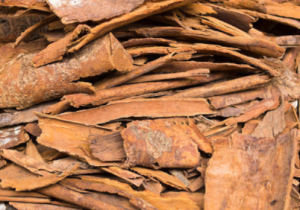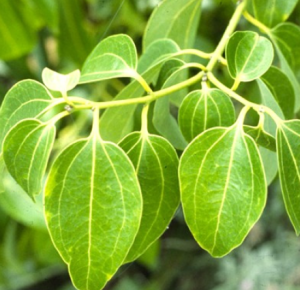BOTANICAL NAME: Cinnamomum zeylanica
FAMILY: Lauraceae
Sushrut- Eladivarga
ENGLISH NAME: Cinnamon
COMMON NAME:
Hindi Name– Dalchini
EnglishName– Cinnamon
TeluguName– Lavangapatt


REFERENCE: BHAVAPRAKASH SAMHITA with link e Nighantu:
https://niimh.nic.in/ebooks/e-Nighantu/bhavaprakashanighantu/?mod=read
त्वक्स्वाद्वी तु तनुत्वक्स्यात्तथा दारुसिता मता |
उक्ता दारुसिता स्वाद्वी तिक्ता चानिलपित्तहृत् |
सुरभिः शुक्रला वर्ण्या मुखशोषतृषापहा ||५७||
HABITAT:
Found wild in the southern coastal region of western India. The main source of cinnamon is Srilanka. Also grows in Brahmadesha, China, Southern India and Himalayas. Found wild in the southern coastal region of western India. The main source of cinnamon is Srilanka. Also grows in Brahmadesha, China, Southern India and Himalayas.
BOTANICAL DESCRIPTION:
A small evergreen tree, 6.1-7.6 m high. Bark- brown and rough (in aged trees); 16 cm thick, inner surface of commercial bark is somewhat darker than the outer and finely striated longitudinally. Leaves are coriaccous, glaucous green above, with spicy odour when bruised, 3-5 veined, 10.2-21.3 cm. long. Flowers are small, with disagreeable smell. Fruits are ellipsoidal, 1-seeded, dark purple berry,1.3-2.5 cm long. Flowering and Fruiting during the spring.
AYURVEDIC CHARACTERISTICS:
| RASA | GUNA | VEERYA | VIPAKA | PRABHAVA | DOSHAGHNTA |
| Katu
Tikta Madhur |
Laghu
Ruksha Tikshna |
Ushna | Katu | Balya
Varnya Grahi |
Vatpitthar |
AYURVEDIC ENERGETICS:
| TASTE | PROPERTY | POTENCY | POST DIGESTIVE EFFECT | EFFECT ACTION | DOSHA ACTION |
| Pungent bitter sweet | Light
Dryness Sharp |
Hot | pungent | Skin complexion | Pacifying vata pitta |
MAJOR CHEMICAL CONSTITUENTS: Cinnamaldehyde, eugenol, benzaldehyde, methyl alnyl ketone, phellandrene, pinene, cymene, linalool, cumic aldehyde, caryophyllene, safrole, methyl evgenol, borneol, cinnamyl alcohol, cinnzeylanin, cinnzeylanol.
THERAPEUTIC USES:
- Cough – Powders of Tvak, Ela, Pippali, Tavaksiri and sugar (each double than the other in quantity) are mixed together and taken with honey.
- Headache – Nasya with Tvak Kalka, Patra and Sarkara along with ice-water is useful in Pittajasirasua
- Dysentery – Tvak powder is given in 1 g dose.
USEFUL PART: Stem bark, oil, leaves
DOSAGE: Powder: 2-4 g; oil: 2-5 drops
AYURVEDIC FORMULATION:
1. Eladirasayana
2. Sitopaladichurna
3. Samasakarachurna
